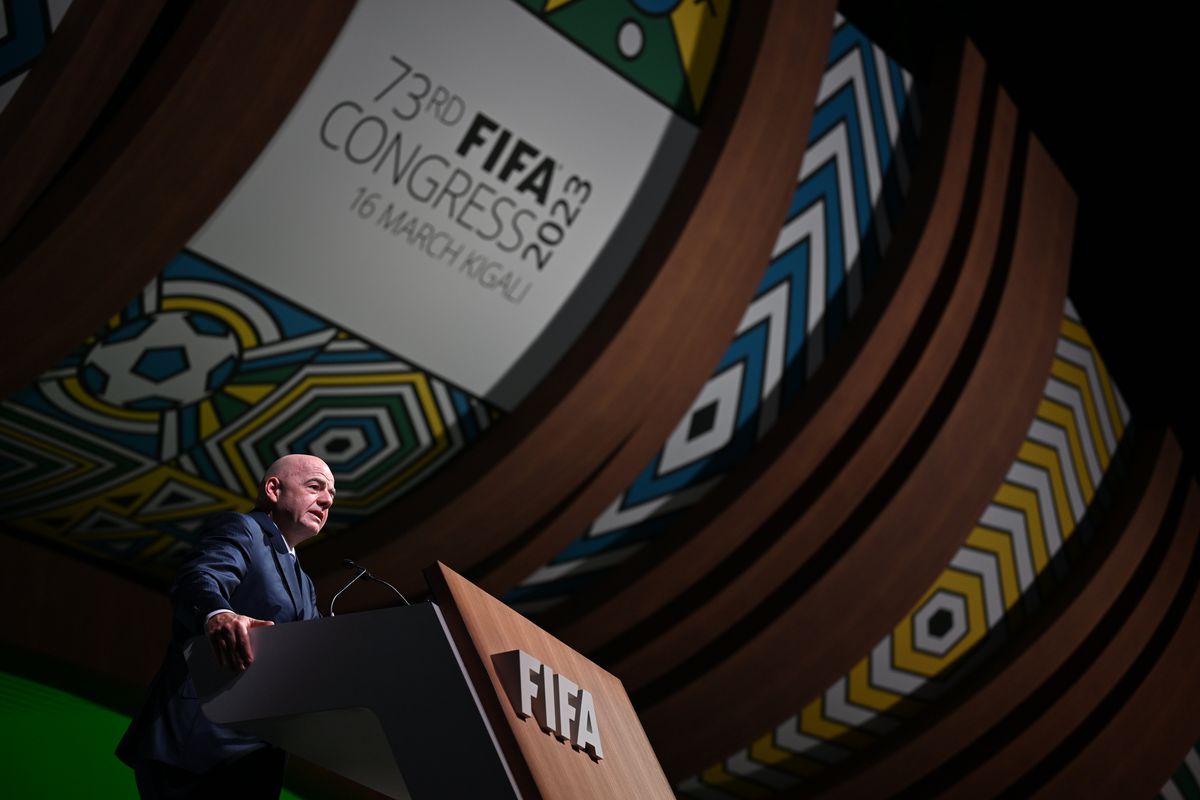FIFA president Gianni Infantino has won another four-year term after standing unopposed. Although there was no other conceivable outcome, given the lack of a challenger, Infantino did not have the support of the German football association, the DFB.
DFB president Bernd Neuendorf had released the following statement in advance of the 73rd FIFA Congress in Kigali, Rwanda:
“The DFB will not support the re-election of FIFA president Gianni Infantino in Kigali. We have received little to no substantial information from FIFA in response to several inquiries from our part in recent weeks, especially on contentious issues. However, we can expect FIFA to take the concerns of its member associations seriously and address them. FIFA should become much more transparent and open in its dealings with the national associations. It is in its own interests to explain how and why certain decisions are made and who is involved in them. This has not been the case of late.
Nevertheless, there was a constructive exchange between several European member associations and the FIFA president on contentious issues today. We therefore remain hopeful that this will lead to an improvement in our cooperation in the future.
I am interested in maintaining a critical and constructive cooperation with FIFA, in particular with its president, and hope that this can be realised in the coming years.”
Via DW, Neuendorf had also previously said that the DFB’s vote would hinge in part on an evaluation of Infantino’s promises made in Qatar. Although FIFA’s late banning of the OneLove armband (and the ensuing fallout that included Bayern Munich stars) is also a source of apparent contention, in this case, it seems to refer to an expansion of worker protections in Qatar and promises of a legacy fund to support compensation. From the DW article:
“I remember his [Infantino’s] press conference in Doha and the promises he made there,” Neuendorf said. “I have to admit that I don’t really have the feeling that this is being worked on at the moment.”
Infantino gave a famously fiery speech in Doha on the eve of the 2022 FIFA Men’s World Cup in Qatar, in which he emphasized that he, too, shared the feelings of Qatari, Arab, African, gay, and disabled people, as well as migrant workers. Infantino explained then that, because as a child he was “bullied” for his red hair and freckles, he was keenly aware of what it’s like to be discriminated, especially in a foreign country.
Infantino also lashed out at Western hypocrisy in criticism of Qatar and claimed that “there is a legal framework to cover workers’ compensation” for migrant workers in Qatar, a claim which Human Rights Watch said “deserves particular scrutiny” — owing to access barriers in the system and the propensity of Qatar to classify worker deaths as other than work-related. As of March 16, 2023, HRW is still calling on FIFA to make commitments via the World Cup’s legacy fund to compensate workers and their families.
Amnesty International also criticized Infantino’s accusations of hypocrisy at the time, saying in a statement: “In brushing aside legitimate human rights criticisms, Gianni Infantino is dismissing the enormous price paid by migrant workers to make his flagship tournament possible – as well as FIFA’s responsibility for it.”
In the aftermath of his re-election, Infantino appeared to celebrate his connection to the Rwandans by noting that, like those who overcame genocide, he, too, persevered by continuing his campaign to become FIFA president eight years ago despite his failure to rally local support. However, he has apparently later denied the directness of the comparison. Via the New York Times:
In his opening remarks on Thursday, Infantino recalled how he had traveled to Rwanda to lobby African officials during his first campaign to become FIFA president eight years ago. After being told that he could not count on their support, he said that he had been on the verge of pulling out.
But, he said, a visit to a memorial to the victims of the 1994 Rwandan genocide had “inspired” him to stay in the race, noting how well the country had rebounded in the intervening years. He later denied making the comparison, suggesting later his words had been misinterpreted.
Infantino also said: “Those who love me, I know there are so many, and those who hate me, I know there are a few. I love you all.”
That sentiment, at present, does not seem to be reciprocated within the DFB.
“We will scrutinize FIFA,” Neuendorf promised (via DW).

